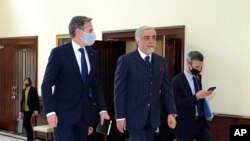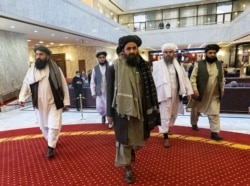U.S. Secretary of State Antony Blinken carried American assurances to Afghanistan during an unannounced visit Thursday to discuss the coming withdrawal of all 2,500 U.S. troops by September 11.
Blinken sought to reassure Afghan officials that the U.S. would still be committed to the country where U.S. troops have been stationed since 2001, following the terrorist attacks on New York and Washington on September 11 of that year.
“I wanted to demonstrate with my visit the ongoing commitment of the United States to the Islamic republic and the people of Afghanistan,” Blinken told Afghan President Ashraf Ghani at the presidential palace in Kabul. “The partnership is changing, but the partnership itself is enduring.”
"We respect the decision and are adjusting our priorities,” Ghani told Blinken, expressing gratitude for the sacrifices of U.S. troops.
At a news conference later in the day, Blinken said the U.S. would work to prevent another terrorist attack from emanating from Afghanistan.
“We will be repositioning the tools and assets that we have to guard very carefully against the possible reemergence of other threats from Afghanistan,” he said. “And we're confident that we have the means to do so.
“In addition, the Taliban did make a commitment in the agreement that it reached with the United States last year to prevent the reemergence of al-Qaida here in Afghanistan as well. We will hold them to that commitment.”
During the Trump administration, the U.S reached an agreement with the Taliban to withdraw U.S. troops by May 1. Biden’s pushing the deadline back by months angered the insurgent group.
The Taliban issued their formal response to Biden’s troop drawdown plans Thursday, criticizing the United States for delaying its departure.
The insurgent group declared the U.S. move a “clear violation of the Doha agreement and noncompliance with its commitment.” It urged Washington and its allies to withdraw all their forces from Afghanistan by May 1 in line with the U.S.-Taliban pact.
"Now as the agreement is being breached by America, it in principle opens the way for the Mujahideen of Islamic Emirate [Taliban fighters] to take every necessary countermeasure, hence the American side will be held responsible for all future consequences, and not the Islamic Emirate.”
No good choices seen
Some analysts view Biden's decision as the best of an array of bad options.
"There's probably no option that significantly reduces the level of violence. There's also probably no option on the table to build the Afghanistan that the United States probably had in mind when they invested more than a trillion dollars in the war," said University of Chicago assistant professor Austin Wright, whose research focuses on insurgents and Afghanistan.
But some lawmakers and human rights advocates have been critical of the move, saying Afghans will suffer the consequences.
“My views are very pessimistic,” Naheed Farid, a member of the Afghan parliament, told reporters. Farid, along with a half-dozen civic leaders, met with Blinken at the U.S. Embassy in Kabul.
On Wednesday, NATO announced it was also withdrawing its 7,000 troops from the country, saying they would be leaving over the next months.
Biden made his announcement in a televised speech Wednesday, saying the war "was never meant to be a multigenerational undertaking.”
No justification left
He said the United States could no longer justify staying there two decades after the terrorist attacks on the World Trade Center and Pentagon.
"We went to Afghanistan because of a horrific attack that happened 20 years ago," Biden said at the White House. "That cannot explain why we should remain there in 2021."
Over the course of the U.S. involvement in Afghanistan, more than 2,200 U.S. troops have been killed and over 20,000 have been wounded. It is estimated that the U.S. has spent over $1 trillion on the war, America’s longest.
According to the World Bank, more than half of Afghans live on less than $1.90 a day. It is also considered one of the worst countries for women’s rights, according to the Georgetown Institute for Women, Peace and Security.










